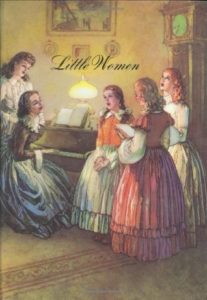The History and Future of the Western in 10 Books
Part immigrant story, part adventure tale, and part allegory of truth and justice—the Western has been entertaining American readers for nearly two hundred years. Maybe we’re drawn to the setting: a frontier where mountains claw at the sunset and calamity is just around the corner. Or maybe it’s the almost mythical characters who find themselves thrust into the middle of nail-biting dramas. It could simply be the charming horses.
So many of America’s myths about itself—many of them historically inaccurate, misogynistic, or both—are reflected in the genre that literary writers have been turning their attentions to in recent years. To help make sense of these contemporary efforts, consider this crash course on the origin and future of the Western genre.
How “Little Women” Got Big
 Focusing on a new book, Meg, Jo, Beth, Amy: The Story of ‘Little Women’ and Why It Still Matters (Norton), by Anne Boyd Rioux, an English professor at the University of New Orleans, Joan Acocella offers an exploration of the continuing influence of Louisa May Alcott’s novel Little Women.
Focusing on a new book, Meg, Jo, Beth, Amy: The Story of ‘Little Women’ and Why It Still Matters (Norton), by Anne Boyd Rioux, an English professor at the University of New Orleans, Joan Acocella offers an exploration of the continuing influence of Louisa May Alcott’s novel Little Women.
Some people complain that university syllabuses don’t accord “Little Women” the status of “Huckleberry Finn,” which they see as its male counterpart. But no piece of literature is the counterpart of “Little Women.” The book is not so much a novel, in the Henry James sense of the term, as a sort of wad of themes and scenes and cultural wishes. It is more like the Mahabharata or the Old Testament than it is like a novel. And that makes it an extraordinary novel.
The Lie of Little Women
Sophie Gilbert offers a different interpretation of Little Women from the one above:
Her [Louisa May Alcott’s] ambivalence emboldened her to unsettle conventions as she explored women’s place in the home and in the world—wrestling with the claims of realism and sentimentality, the appeal of tradition and reform, the pull of nostalgia and ambition. Her restless spirit is contagious. The more Alcott’s admirers seek to update her novel, drawing on her life as context, the more they expose what her classic actually contains.
The Power of Immigrant Stories
Vanessa Hua, author of A River os Stars, “reflects on how untold stories lead to the loss of humanity.”
“So many people in this country think that there’s only a handful of legitimate stories that make you American, but we all belong,” Michelle Obama has said. “We need to know everybody’s stories, so we don’t forget their humanity. And if we share these stories, we can be more inclusive and empathetic and forgiving.”
How Two Thieves Stole Thousands of Prints From University Libraries
A fascinating look at how Robert Kindred, an antique print dealer, and his partner Richard Green spent the summer of 1980 visiting college libraries and stealing nineteenth-century scientific illustrations from rare books and journals.
© 2018 by Mary Daniels Brown

